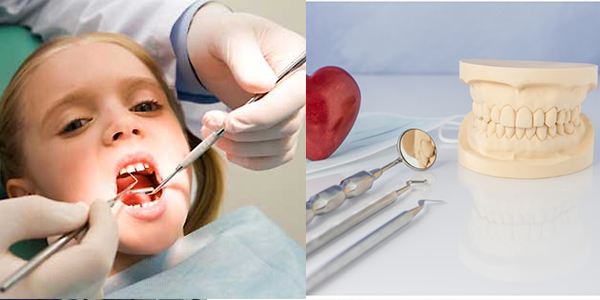Dental Hygiene
Dental Hygiene / Hygienists use digital & traditional x-ray machines to take and develop dental pictures. They may use models of teeth to explain oral hygiene, perform root planing as a periodontal therapy, or apply cavity-preventive agents such as fluorides and pit and fissure sealants. In some states, hygienists are licensed to administer local anesthetics using syringes. Some states also allow hygienists to place and carve filling materials, temporary fillings, and periodontal dressings; remove sutures; and smooth and polish metal restorations.
Dental hygienists also help patients develop and maintain good oral health. For example, they may explain the relationship between diet and oral health or inform patients how to select toothbrushes and show them how to brush and floss their teeth.
Hygienists sometimes make a diagnosis and other times may prepare clinical and laboratory diagnostic tests for the dentist to interpret. Hygienists sometimes work chair side with the dentist during treatment.
Skills Required :
A career as dental hygienist is most apt for the individuals who wish to carry out their profession by directly involving with patients and who like to have flexibility in their work schedule. The dental hygienists must possess certain qualities and skills to perform in this area. Since they work directly with different types of patients, they must be able to handle them and should have patience. They must be dexterous and should have steady hands to properly and safely clean the patients’ teeth. Besides, they must have good eyesight and communication skills.
Subject / Syllabus :
- Oral Hygiene.
- Dental Care & Pharmacology.
- Advance Tech. & Advancement.
- Density Chair Side Assistance.
- Practical.
- Viva voca.
Eligibility & Admission Process :
Those individuals who wish to become a dental hygienist should first apply for an associate degree or bachelor’s degree in dental hygiene. This can be done after successfully finishing their senior secondary education with biology from a reputed school. On completing this degree programme, they need to apply for the licensing examinations, since most of the countries require these candidates to be licensed to practice as a dental hygienist.
Colleges :
- Government Dental College & Hospital, Afzalganj.
- Patna Dental College & Hospital, Bankipur, Patna.
- Government Dental College & Hospital, Ahmedabad.
- H.P. Government Dental College & Hospital, Shimla.
- Government Dental College, Rohtak.
- Government Dental College, Bangalore.
- Dental College, Kozhikode.
- Government Dental College, Thiruvananthapuram.
- SCB Medical College, Dental Wing.
- Government Dental College & Hospital, Mumbai.
- PB. Government Dental College & Hospital, Amritsar.
- Institute of Medical Sciences, Varanasi.
- Dental Wing of U.P. King George University of Health Sciences, Varanasi.
- Department of Dental Surgery, J.N. Medical College, Aligarh Muslim University.
- Tamil Nadu Government Dental College & Hospital.
- Dr. Ahmed Dental College & Hospital, Kolkata.
Dental Hygiene Job Prospects & Salaries :
Dental hygienists hold about 173,900 jobs, and about 96 percent of dental hygienists work in offices of dentists. A small number work for employment services in physicians’ offices or other industries. The number of jobs exceed the number of hygienists because multiple job holding is common. Over 50 percent of dental hygienists work part-time.
Job growth for dental hygienists is expected to increase by 36 percent in the next decade, which is much faster than average for all occupations. This is mainly in response to a growing demand for dental care and more use of hygienists. As a growing emphasis is placed on preventative dental care, population grows and older people increasingly retain more teeth, there will be a growing demand for dental services. Job prospects will vary by geographical location, but are expected to be favorable in most areas. Dental hygienists who wish to practice in areas that have an abundance of dental hygiene programs may experience keen competition for jobs because graduates are permitted to practice only in the State in which they are licensed.
Some job growth will occur because older dentists who are less likely to employ dental hygienists are leaving the occupation to be replaced by recent graduates, who are more likely to employ one or more hygienist. More dental hygienists are expected to be hired to perform preventative dental care, as dentists’ workloads increase so that they may devote their time to more complex procedures.





